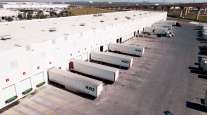E-Commerce Fuels Cargo Surge at Chicago Rockford International Airport

More than 1.3 billion pounds of cargo made its way through Chicago Rockford International Airport last year, a nearly 50% increase over 2016.
E-commerce is the reason for the airport’s cargo surge, which began in the fall of 2016. That’s when ABX Air began ferrying cargo through the airport for Amazon. Atlas Air, another leader of the air freight industry, is also routing regular cargo flights through Rockford for the e-commerce retailer.
UPS Inc. bolstered its cargo activity in Rockford last year, too. It added seven daily cargo flights here after moving 250 jobs from Des Moines, Iowa, to the Rockford parcel-sorting center — its second largest air freight hub in North America.
UPS ranks No. 1 on the Transport Topics Top 100 list of the largest North American for-hire carriers.
Today, the peak holiday shipping season is over, those extra cargo flights are still running, and UPS employs 2,379 part-time and 377 full-time permanent workers at its Rockford hub, said Karen Tomaszewski, a spokeswoman for the Atlanta-based package shipper.
“We’re out of the peak season now and our cargo volumes aren’t dropping off as they traditionally do,” said Zack Oakley, the airport’s director of operations.
The 1.3 billion pounds of cargo that landed at the Rockford airport translates into $800,000 or more in landing fees, which Airport Director Mike Dunn said will help the airport pay for operations and capital improvements to handle the cargo growth. And because cargo activity is factored into the level of federal aid the airport receives, the prospect for more aid grows as cargo activity increases.
The airport received a $5 million federal grant last year to expand its cargo apron to accommodate more jets on the ground. The apron was completed late last year, and there’s still hundreds of undeveloped acres within the airport campus to accommodate future growth.
Dunn said he expects the cargo surge to continue in 2018. He estimates total landed cargo weight at the airport this year could be 20% above last year’s figures. E-commerce is fueling the surge, he said, and the airport’s strategy is to become a Midwest hub for e-commerce air freight.
“We still have lots of room to grow,” Dunn said.
The future looks bright for those doing cargo business at the airport, too.
UPS has a couple hundred expansion projects in play around the globe, and has increased capital spending in recent years to upgrade its network to handle the growth in e-commerce deliveries. The world’s largest package delivery company estimates it delivered 750 million packages between Thanksgiving Day and New Year’s Eve, up 6% from 2016, and handled a record 6 million package returns following the Christmas holiday.
Last year was a big one for Amazon, too. The company was responsible for an estimated 44% of all e-commerce sales in the U.S. and 4% of the country’s total retail sales, a figure in the area of $200 billion, according to a study by One Click Retail.
“The hard time all the carriers are having is hitting those e-commerce projections,” Oakley said. “E-commerce is just growing so rapidly that it’s hard to project. The peak holiday shipping season is no longer that two-to-three week period. It’s a month, two months, and it just keeps stretching out.”
Distributed by Tribune Content Agency, LLC




